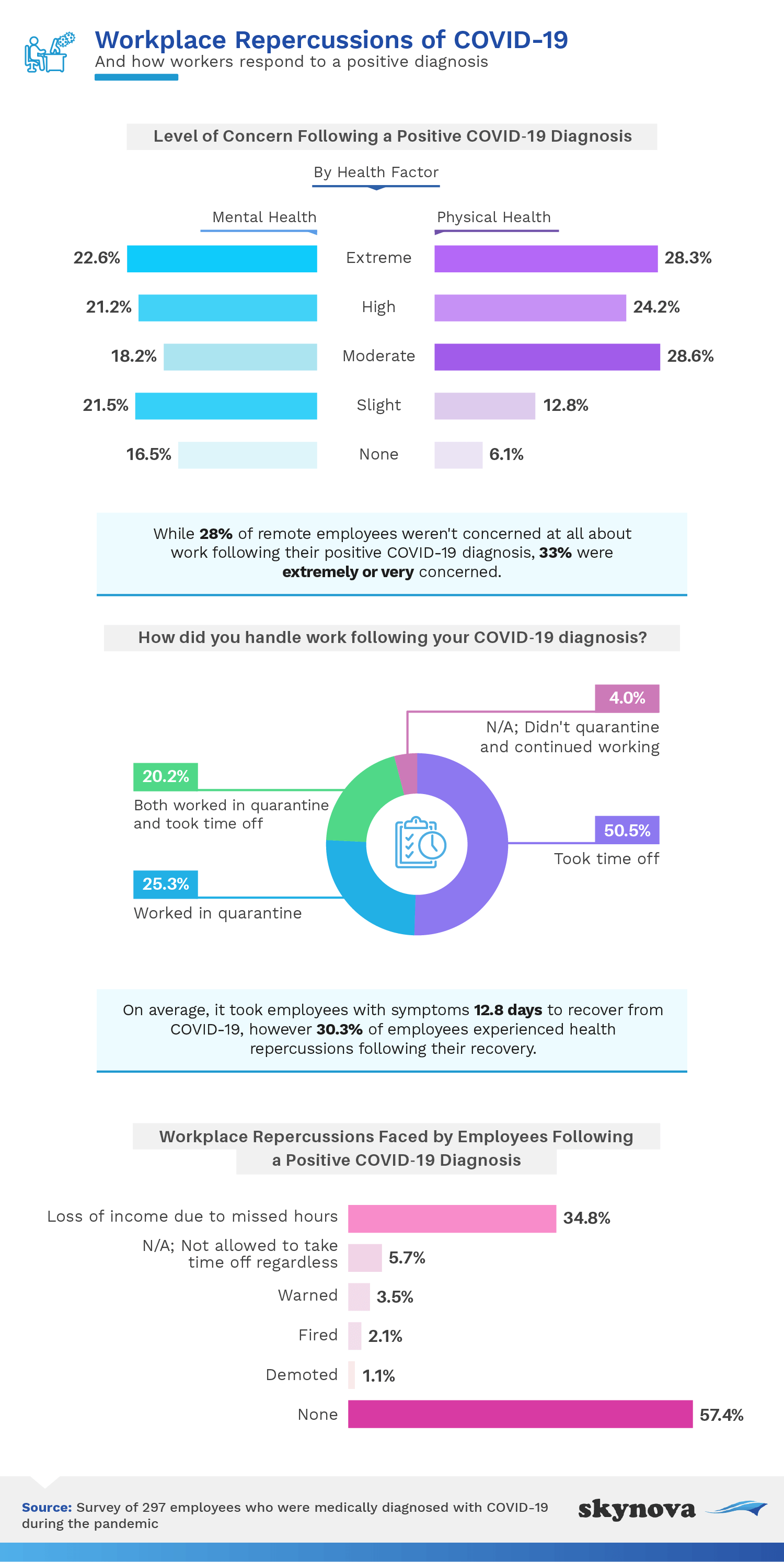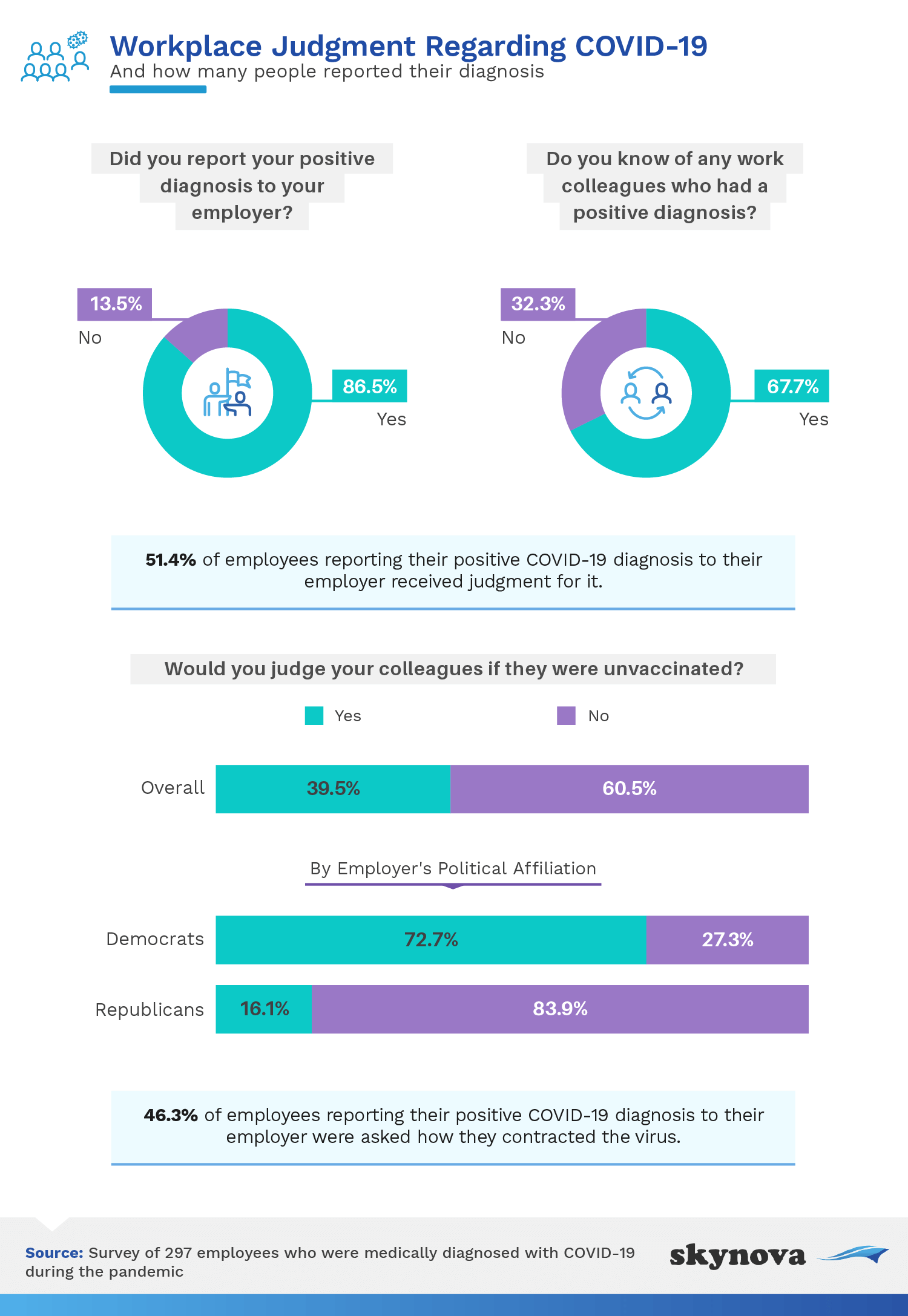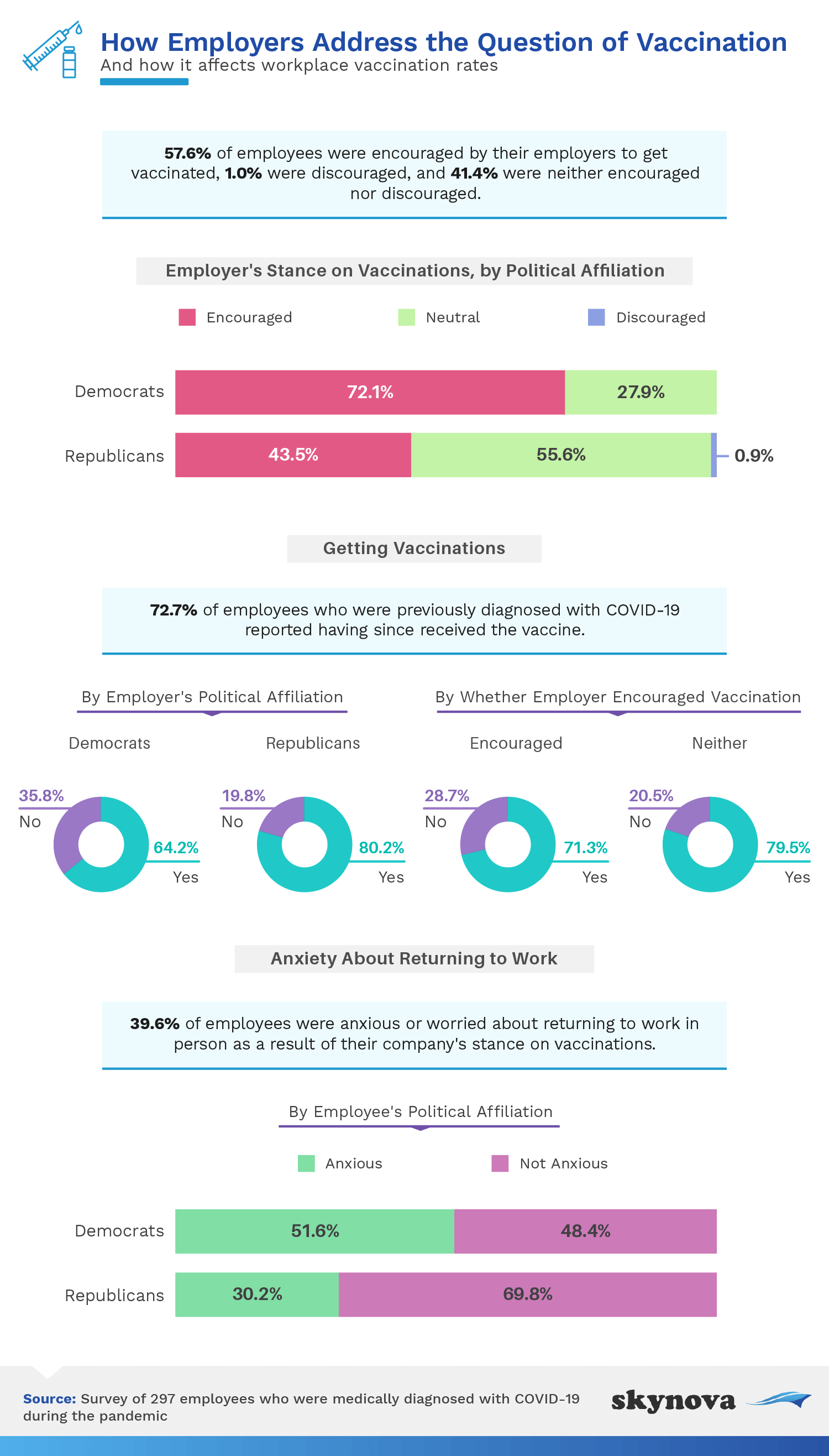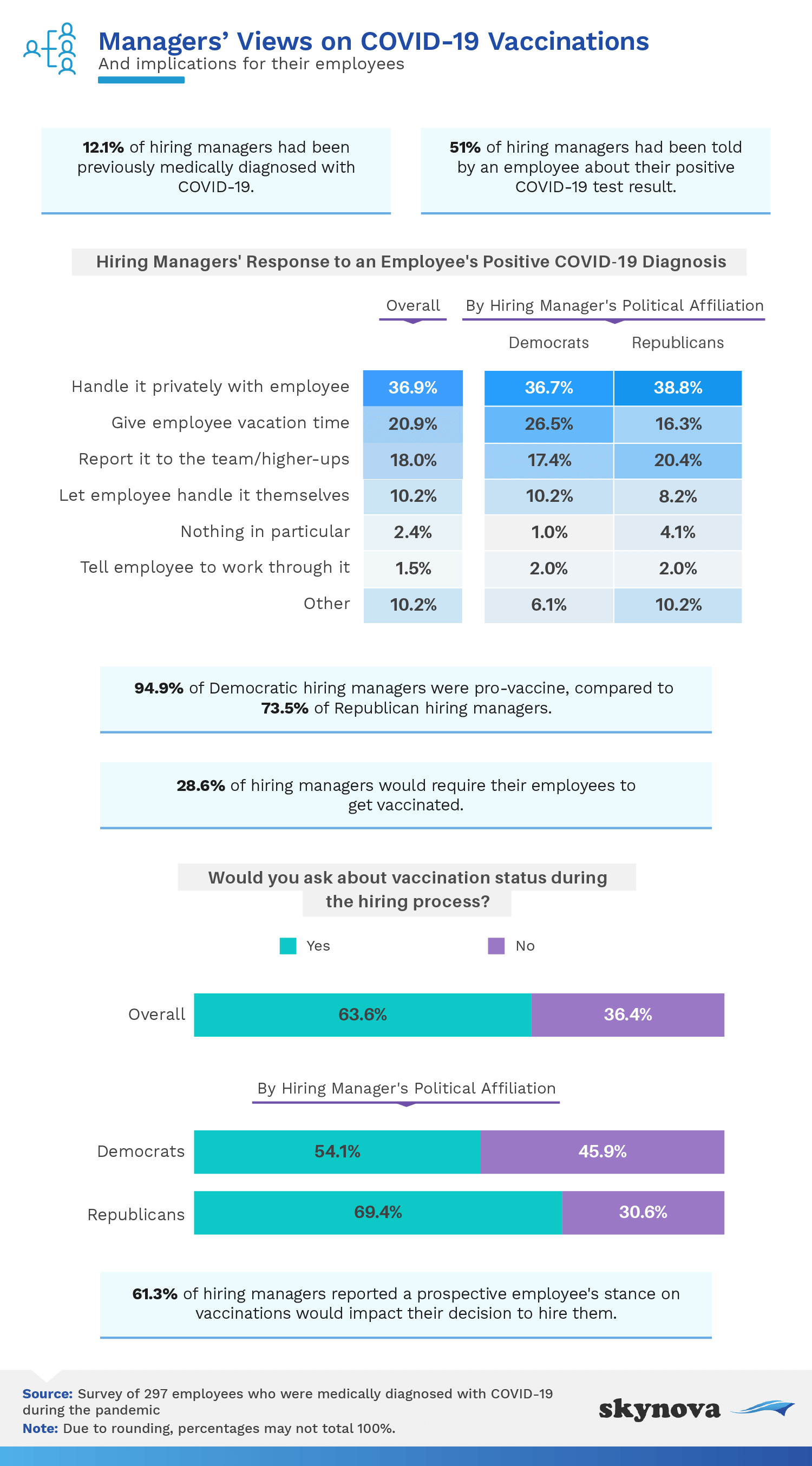
|
Testing positive for COVID-19 is scary enough, and workplace repercussions can make matters even worse. Employees are faced with social stigma, the threat of financial loss, and the mental stress of reporting their diagnosis to those around them. Even as we move past the pandemic, the decision of whether or not to vaccinate is a controversy that’s already infiltrating the workplace.
To better understand the experience of testing positive for COVID-19 in the workplace, we spoke to a very unique pool of candidates. Hundreds of employees who had received a positive COVID-19 diagnosis while employed shared with us what happened, including who they told (if anyone), how the information was received, and what repercussions they faced. We also dug into workplace approaches to the vaccine rollout. Keep reading to find out more about the powerful perspective that this group has to share.
While physical health is the primary concern of contracting COVID-19, especially for certain risk categories, mental health can also be affected by receiving a positive diagnosis. The first section of our study looks at the level of concern employees felt for both their physical and mental health as well as the workplace repercussions that followed contracting COVID.
Nearly as many employees felt extremely concerned for their mental health as did for their physical health when finding out they had COVID-19. More than a third were also extremely or very concerned about their work, too – and evidently for good reason. Nearly 35% of respondents lost income due to missed hours, 3.5% received a warning, and 2.1% were even fired. More than a quarter of employees chose to work throughout their entire illness in spite of the fact that it took them an average of 12.8 days to recover physically. A fortunate majority of 57.4% reported, however, that they experienced no work-related repercussions.

Judgment was incredibly common when it came to COVID-19 diagnoses in the workplace. Managers and co-workers alike admitted to judging their colleagues for a positive result and some even admitted to hiding their own diagnoses from employers.

Judgment from peers may ultimately be helping to spread COVID-19. More than half of those who did report their diagnosis received judgment. This was likely correlated with the fact that over 13% of confirmed diagnoses went completely unreported at work. Employers also commonly asked potentially invasive questions when employees came forward, with 46.3% of respondents saying they were asked how they potentially contracted the virus.
Workplace judgment was also common against those who are unvaccinated. This was particularly true for respondents with perceived Democratic-leaning employers, with 72.7% agreeing that employers of this political affiliation would judge employees for choosing not to receive the vaccine. While the Centers for Disease Control and Prevention (CDC) typically publishes what’s known as a Vaccine Information Statement (VIS) for each vaccine listing its benefits and risks, there is not yet one available for the COVID-19 vaccine. This could explain some workers’ hesitance to get vaccinated despite the risk of workplace stigmatization.
With so much stigma connected to this particular medical decision, we wanted to know how employers were approaching the topic. The next section of our study asked employees to share how their places of work encouraged or discouraged the vaccine.

Employers primarily encouraged vaccinations or remained neutral. A minute number of employees (1%) said they were actively discouraged from taking the vaccine. Politics played a heavy role in influencing how Democrats and Republicans approached this: 72.1% of Democratic employers encouraged their employees to get vaccinated, while just 43.5% of Republican employers did the same.
The emotions around returning to work were also heavily influenced by employees’ political affiliation. Democrats considered themselves much more anxious than Republicans when asked how they felt about returning to on-site work.
Our study wraps up with a look at how the people in charge felt as the pandemic and vaccine rollout unfolded. They shared how employees approached them and what their typical response was. We even asked how vaccination may play into future hiring decisions.

More than half of the managers we spoke to had been informed by an employee of a positive diagnosis for COVID-19. The most common response (for Republicans and Democrats alike) was to handle the matter privately with the employee. Only 18% reported the diagnosis to the team or to higher-ups. If you’re wondering whether your employer is legally required to let the office know, employment attorneys say that’s hard to answer. While there’s no law that specifically requires employers to inform workers about a positive case in the workplace, the CDC recommends that employers alert workers if possible exposure occurred.
Vaccinations may very well impact the hiring process. Over 3 in 5 hiring managers said they would ask about the vaccination status of a job candidate, with Republicans (69.4%) more likely to ask than Democrats (54.1%). An even higher percentage (61.3%) said the answers to those vaccination questions would impact their ultimate hiring decision.
Reporting your medical information in times like these makes business tricky. Legal requirements are unclear, and employees are reportedly facing stigma, financial loss, and, in some cases, being let go. Evidently, the political affiliation of your boss may also influence the fallout from discussing a positive result.
As vaccinations continue to roll out across the country, American workers are likely to find that getting vaccinated could contribute to their workplace happiness. Employers were quick to say vaccination questions would be asked during the application process and may ultimately factor into hiring decisions.
Skynova provides online invoice templates tailored to the needs of small and even microbusinesses.
In this study, we conducted two separate surveys on Prolific. First, we surveyed 297 employees who were medically diagnosed with COVID-19 during the pandemic. 46.5% identified as women, 52.2% identified as men, and 1.3% identified as nonbinary. The average age of these respondents was 31.6 years with a standard deviation of 10.3 years. Secondly, we surveyed 206 hiring managers in upper management positions. 36.4% identified as women, 62.6% identified as men, and 1% identified as nonbinary. The average age of these respondents was 39.8 years with a standard deviation of 11.4 years.
The main limitation of this study is the reliance on self-report, which is faced with several issues such as, but not limited to, attribution, exaggeration, recency bias, and telescoping.
Destigmatization of COVID-19 issues can evidently lead to some healthy results. One way to achieve this is to share information such as that included in this study. You’re welcome to share our data, just be sure your purposes are noncommercial and that you link back to this page.